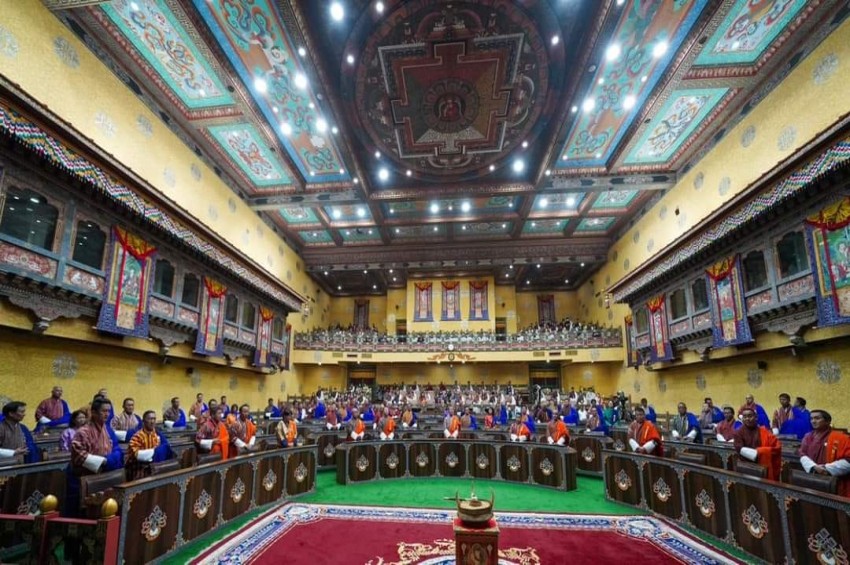On May 23, 2022, the Office of the Attorney General (OAG) and the Anti Corruption Commission (ACC) signed a memorandum of understanding (MoU), on strengthening partnership and collaboration on prevention, investigation and prosecution of corruption cases. A joint press release from the two agencies said that the MoU provides a framework for professional communication and collaboration between the two agencies to work closely in the best national inteest of the country.
“Both the OAG and the ACC regrets the lack of inter-agency coordination in the past and are committed to a new chapter of open communication and collaboration going forward, towards fulfilling the respective constitutional mandates and serve the Tsa-wa-Sun,” the joint press release states. However, observers are not sure if there would be a “new chapter” at all.
A practicing lawyer said it was great to read the joint press release where both the ACC and OAG have finally and openly accepted that there were issues between the two. “Accepting mistakes are the first steps towards solving an issue,” he said. However, he said that the MoU speaks about strengthening partnership and collaboration on prevention, investigation and prosecution of corruption cases and that the MoU provides a framework for professional communication and collaboration between the two agencies to work closely in the best national inteest of the country. “This does not solve the issue currently at stake, the very thorn, which is if ACC can prosecute or not; or in simple terms section 128 (3) as the MoU is silent on it.” “What is the so called framework,” he questioned.
However, another legal expert said enough have been said about constitutionality, conflict of intetests and others. “There are many legal experts for a small country like Bhutan,” he said, adding that no matter what the MoU spells out, the “real fate and modalities for the two to work together will be decided by our parliamentarians.” “I just hope that our parliamentarians will understand the timing of this MoU and the events that led to it. Even if all do not know, the Committee involved in this should know and accordingly brief their members,” he said.
A senior lawyer also said the MoU just mentions cooperation between the two agencies and it will be interesting to see the modalities of working together. According to him, there are different kinds of cases and in major cases at-least, the cooperation must start once investigation begins, to ensure both agencies are on the same page. Additionally, he said that if both institutions fulfill their constitutional mandate and understand their respective roles, the need for a MoU is redundant. “The prosecutorial discretion (PD) of OAG is a means of keeping check on limited resources and aspiring to do justice without burdening the court system with weak cases (sketchy evidence). PD becomes controversial when it extends beyond the power to discard cases with weak or no evidence,” he said.
He underlined that the decision whether or not to prosecute is the most important step in the prosecution process. According to him, every case must be decided taking into consideration interest of the victim, suspected offender, and the community at large and ensure the right decision every time. He added that a wrong decision to prosecute or conversely not to prosecute, both tends to undermine the confidence of the public in the criminal justice system. Further, he highlighted that there must be sufficient evidence and reasonable prospect of obtaining a conviction or directive and that the prosecution must be in public interest (serious offenses). “Cases with precedence value. cost benefit analysis, whether administrative action or plea bargaining would be more efficient,” he said , adding that prosecuting officials for minor infractions will make civil servants over cautious and devise tedious procedures to avoid making mistakes, eventually leading to harassment of the common man dealing with government offices.
“Therefore, if the OAG exercises its PD arbitrarily, the authority of ACC to assume prosecutorial responsibility on behalf of the State must be deemed valid (check and balance),” he said, further adding that the right of ACC to prosecute does not hamper the OAG’s PD. “ACC initiates prosecution only after the OAG has already exercised its discretion. Provisions of the constitution and the laws must be considered holistically. OAG responsibilities must be undertaken free of any political considerations. Whether to prosecute or withdraw a criminal proceeding is not an issue of government policy,” he underscored.
While the above are legalities involved, common people like businessman Tshering Dorji says he cannot understand what the problem is. “I have read the press release and found out that both the ACC and OAG has said that corruption should be uprooted collectively. If this is the case, what is the issue? Are our elected leaders getting in between,” he questioned. Tshering said that the OAG should not have any problems if the ACC can beyond reasonable doubt prove that a case should be prosecuted. “Similarly, the ACC should be content if the OAG can do the same,” he said.
“Both the OAG and the ACC regrets the lack of inter-agency coordination in the past and are committed to a new chapter of open communication and collaboration going forward, towards fulfilling the respective constitutional mandates and serve the Tsa-wa-Sun,” the joint press release states. However, observers are not sure if there would be a “new chapter” at all.
A practicing lawyer said it was great to read the joint press release where both the ACC and OAG have finally and openly accepted that there were issues between the two. “Accepting mistakes are the first steps towards solving an issue,” he said. However, he said that the MoU speaks about strengthening partnership and collaboration on prevention, investigation and prosecution of corruption cases and that the MoU provides a framework for professional communication and collaboration between the two agencies to work closely in the best national inteest of the country. “This does not solve the issue currently at stake, the very thorn, which is if ACC can prosecute or not; or in simple terms section 128 (3) as the MoU is silent on it.” “What is the so called framework,” he questioned.
However, another legal expert said enough have been said about constitutionality, conflict of intetests and others. “There are many legal experts for a small country like Bhutan,” he said, adding that no matter what the MoU spells out, the “real fate and modalities for the two to work together will be decided by our parliamentarians.” “I just hope that our parliamentarians will understand the timing of this MoU and the events that led to it. Even if all do not know, the Committee involved in this should know and accordingly brief their members,” he said.
A senior lawyer also said the MoU just mentions cooperation between the two agencies and it will be interesting to see the modalities of working together. According to him, there are different kinds of cases and in major cases at-least, the cooperation must start once investigation begins, to ensure both agencies are on the same page. Additionally, he said that if both institutions fulfill their constitutional mandate and understand their respective roles, the need for a MoU is redundant. “The prosecutorial discretion (PD) of OAG is a means of keeping check on limited resources and aspiring to do justice without burdening the court system with weak cases (sketchy evidence). PD becomes controversial when it extends beyond the power to discard cases with weak or no evidence,” he said.
He underlined that the decision whether or not to prosecute is the most important step in the prosecution process. According to him, every case must be decided taking into consideration interest of the victim, suspected offender, and the community at large and ensure the right decision every time. He added that a wrong decision to prosecute or conversely not to prosecute, both tends to undermine the confidence of the public in the criminal justice system. Further, he highlighted that there must be sufficient evidence and reasonable prospect of obtaining a conviction or directive and that the prosecution must be in public interest (serious offenses). “Cases with precedence value. cost benefit analysis, whether administrative action or plea bargaining would be more efficient,” he said , adding that prosecuting officials for minor infractions will make civil servants over cautious and devise tedious procedures to avoid making mistakes, eventually leading to harassment of the common man dealing with government offices.
“Therefore, if the OAG exercises its PD arbitrarily, the authority of ACC to assume prosecutorial responsibility on behalf of the State must be deemed valid (check and balance),” he said, further adding that the right of ACC to prosecute does not hamper the OAG’s PD. “ACC initiates prosecution only after the OAG has already exercised its discretion. Provisions of the constitution and the laws must be considered holistically. OAG responsibilities must be undertaken free of any political considerations. Whether to prosecute or withdraw a criminal proceeding is not an issue of government policy,” he underscored.
While the above are legalities involved, common people like businessman Tshering Dorji says he cannot understand what the problem is. “I have read the press release and found out that both the ACC and OAG has said that corruption should be uprooted collectively. If this is the case, what is the issue? Are our elected leaders getting in between,” he questioned. Tshering said that the OAG should not have any problems if the ACC can beyond reasonable doubt prove that a case should be prosecuted. “Similarly, the ACC should be content if the OAG can do the same,” he said.

















